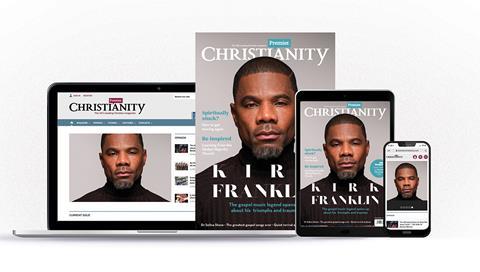Bible translators are increasingly favouring the word ‘trust’ to describe our relationship with God. David Instone-Brewer explains why

Have you ever heard someone say that they really want to believe but can’t? They might comment that they envy your faith and wish they had it. They may know a great deal about Christianity, but their knowledge doesn’t translate to belief.
Personally, I’m full of doubts about everything. The internet is a boon to me, but it’s also made me more sceptical. I’m very conscious that it’s necessary to check new information with reliable sources before I believe it.
Welcome questions
When people came to Jesus with doubts, he presented them with evidence. In response to John the Baptist’s question: “Are you the one who is to come…?” (Luke 7:19) Jesus pointed him to Old Testament prophecies that the Messiah would preach and heal just as he was doing (Matthew 11:2-6, citing Isaiah 35:3-6; 61:1). And when Thomas doubted the evidence of his eyes, Jesus also offered him evidence using his sense of touch: “Put your finger here…Reach out your hand and put it into my side” (John 20:27). Jesus’ offer helped him to jump the gap from doubt to belief, so that he affirmed: “My Lord and my God!” (v28).
Jesus didn’t reprove people for questioning his identity, though he didn’t give them absolute proof. Thomas had far more evidence than us, so Jesus said: “Blessed are those who have not seen and yet have believed” (v29). Unfortunately, although we can offer strong evidence for Jesus’ resurrection, we can never supply absolute proof.
Scientists have the same problem when they are asked about climate change, for example, or a new medical treatment. Sometimes they can put a percentage on their uncertainty, and with increasing evidence it becomes foolish to refuse to act on it. But a competent and candid scientist, historian or theologian will never say that something is completely certain.
When there’s enough evidence, conclusions are stated as scientific theories, historical interpretations or theological doctrines. When there is consensus, most people decide to believe the theory of gravity, the historical interpretation of the Holocaust and even the doctrine of God’s omniscience. Because of this belief, we don’t walk off cliffs, we oppose antisemitism and we are conscious that God knows everything we do. However, we know that one day we might discover that a theory or historical interpretation is incorrect. We may, for example, discover a place where gravity is absent. In the meantime, we ‘know’ – or strictly speaking we ‘believe’ – that gravity is absolutely universal.
I congratulate the honesty of people who say they don’t know that God exists after examining all the evidence. But God doesn’t love or reward people for belief that he exists. James says, “even the demons believe…and shudder” (2:19). Of course, to please God, it is necessary to act in faith – ie as if he exists – otherwise we won’t bother to seek him (Hebrews 11:6). However, when we do seek him, we discover what it is that God really wants: our trust.
Three words, one meaning
The three words ‘belief’, ‘faith’ and ‘trust’ in our English Bibles all translate the same Greek word: pistis. These three different words were used by the King James translators because in their day, they meant almost the same thing: trust.
Our English word ‘faith’ comes from old French feid, which meant loyal, faithful or trustworthy. Our word ‘belief’ derives from Old English geleafa, which meant to believe in, hold dear or trust. And ‘trust’ comes from Old Norse traust, meaning true, loyal and trustworthy. So, the translators of early English Bibles used the words ‘faith’, ‘belief’ and ‘trust’ as virtually synonymous translations of pistis because all three words encompassed the same concept. There’s a similar overlap of meaning in Shakespeare’s writings from around the same time.
God doesn’t love or reward people for belief that he exists
Today, these three words have separated into distinct meanings that early translators didn’t anticipate. ‘Belief’ now usually expresses the gap between evidence and knowledge, eg: “I have enough evidence to believe it’s true.” And ‘faith’ is often used as if it’s a personal power, eg: “I have enough faith to make my visualisations real.” Nowadays ‘belief’ and ‘faith’ usually refer to things such as creeds or institutions. But, like the Greek pistis, ‘trust’ almost always refers to trusting a person.
Because of this, many translations are changing ‘faith’ and ‘belief’ to the word ‘trust’. For example, the KJV translation of Romans 4:5 says he who “believeth on him that justifieth the ungodly, his faith is accounted for righteousness” (my emphasis). Today about a third of English Bibles change the opening “believeth” to “trust” e.g. he who “trusts God…” (NIV, my emphasis). And five Bibles translate both the “believeth” and “faith” as ‘trust’, eg: “you trust him…that trusting-him-to-do-it is what gets you set right with God” (The Message, my emphasis). When reading the Bible, it’s worth mentally replacing ‘faith’ or ‘belief’ with ‘trust’ to help us understand what it means. It usually works.
Bridging the gap
What about the person who envies our ‘faith’ but says they can’t ‘believe’ in God or the resurrection? Like Jesus, we can offer them evidence from prophecies and history, though we should point out that absolute proof is impossible – about this or anything else. We’ll always have to bridge the gap of uncertainty and act in faith – whether believing the theory of gravity or the doctrine of God. But there’s an important difference: when we decide to follow Jesus, the Holy Spirit, who comes to live in us, will help us learn to trust him.







































No comments yet